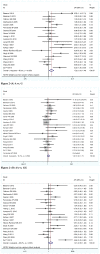Tumor necrosis factor alpha rs1800629 polymorphism and risk of cervical lesions: a meta-analysis
- PMID: 24015171
- PMCID: PMC3755002
- DOI: 10.1371/journal.pone.0069201
Tumor necrosis factor alpha rs1800629 polymorphism and risk of cervical lesions: a meta-analysis
Abstract
Background: Tumor necrosis factor- alpha (TNF-α) is an inflammatory cytokine which may play important role on the immune response may control the progression of cervical lesions. There is a possible association between TNF-α rs1800629 G/A polymorphism and cervical lesions, but previous studies report conflicting results. We performed a meta-analysis to comprehensively assess the association between TNF-α rs1800629 polymorphism and cervical lesions risk.
Methods: Literature searches of Pubmed, Embase, Web of Science, and Wanfang databases were performed for all publications on the association between TNF-α rs1800629 polymorphism and cervical lesions through December 15, 2012. The pooled odds ratios (ORs) with their 95% confidence interval (95%CIs) were calculated to assess the strength of the association.
Results: Twenty individual case-control studies from 19 publications with a total of 4,146 cases and 4,731 controls were finally included into the meta-analysis. Overall, TNF-α rs1800629 polymorphism was significantly associated with increased risk of cervical lesions under two main genetic comparison models (For A versus G: OR 1.22, 95%CI 1.04-1.44, P = 0.017; for AA versus GG: OR 1.32, 95%CI 1.02-1.71, P = 0.034). Subgroup analysis by ethnicity further showed that there was a significant association between TNF-α rs1800629 polymorphism and increased risk of cervical lesions in Caucasians but not in Asians. Subgroup analysis by the types of cervical lesions showed that there was a significant association between TNF-α rs1800629 polymorphism and increased risk of cervical cancer (For A versus G: OR 1.24, 95%CI 1.05-1.47, P = 0.011; for AA versus GG: OR 1.31, 95%CI 1.01-1.70, P = 0.043; for AA/GA versus GG: OR 1.25, 95%CI 1.01-1.54, P = 0.039).
Conclusion: The meta-analysis suggests that TNF-α rs1800629 polymorphism is associated with increased risk of cervical lesions, especially in Caucasians.
Conflict of interest statement
Figures



References
-
- Jemal A, Bray F, Center MM, Ferlay J, Ward E, et al. (2011) Global cancer statistics. CA Cancer J Clin 61 2: 69–90. - PubMed
-
- Forouzanfar MH, Foreman KJ, Delossantos AM, Lozano R, Lopez AD, et al. (2011) Breast and cervical cancer in 187 countries between 1980 and 2010: a systematic analysis. Lancet 378 9801: 1461–84. - PubMed
-
- Schiffman M, Castle PE, Jeronimo J, Rodriguez AC, Wacholder S (2007) Human papillomavirus and cervical cancer. Lancet 370 9590: 890–907. - PubMed
-
- Kahn JA (2009) HPV vaccination for the prevention of cervical intraepithelial neoplasia. N Engl J Med 361 3: 271–8. - PubMed
-
- Balkwill F (2009) Tumour necrosis factor and cancer. Nat Rev Cancer 9 5: 361–71. - PubMed
Publication types
MeSH terms
Substances
LinkOut - more resources
Full Text Sources
Other Literature Sources
Medical

